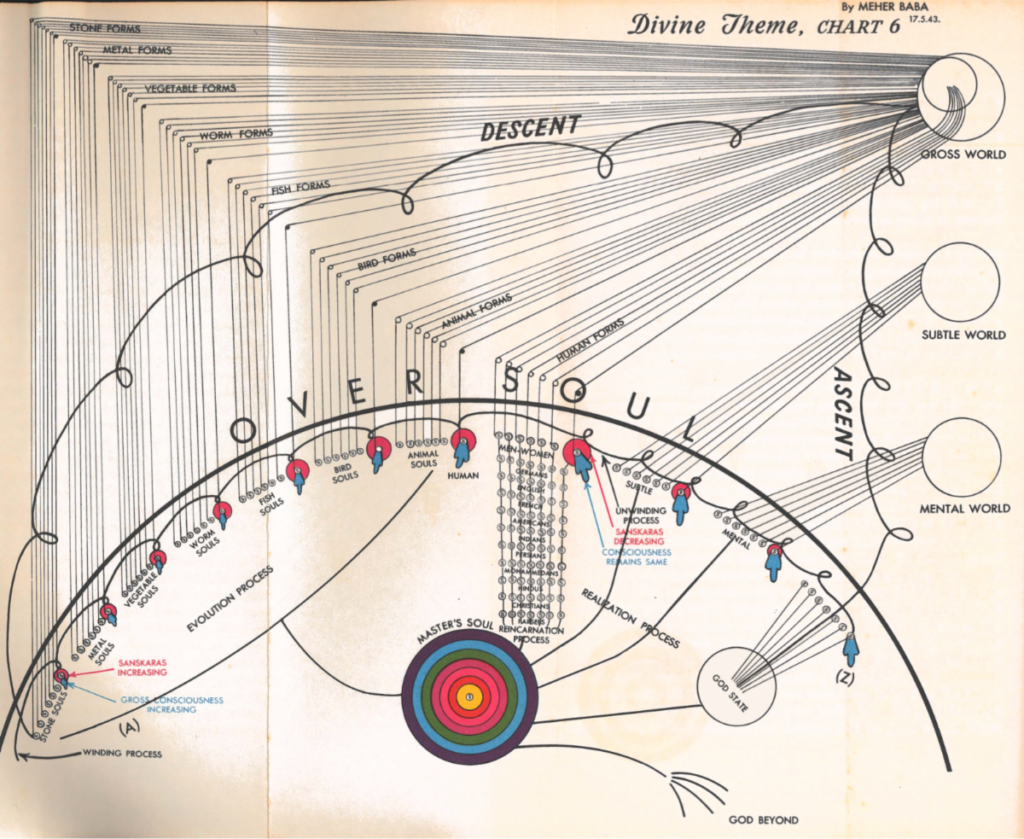
May 27, 2022
A Divine Explanation
On May 14, 1943, 125 men gathered in Meherabad to spend five days with Baba and hear His explanation of the “Divine Theme.” Not uncommonly, Baba had shifted the dates of the meeting in the month leading up to it. But, as Bhau Kalchuri put it, “out of the instability surrounding Meher Baba’s activities came inner stability, as due to his constant change of plans, the mind was focused more and more on him, and less and less on the binding entanglements of the material world.” Each of the 125 stalwart lovers had arrived at the newly appointed time, prepared to hear about the most cosmic of universal truths.
As was often the case around Baba, the gathering started with the give-and-take of a beloved group of friends and family: chatting, making jokes, telling funny stories, singing ghazals. Also, as usual, Baba didn’t let the men forget the one thing that really mattered. He told them that they should be ready on May 17 for a three-hour explanation of the Divine Theme: “I will make it so clear and easy that you will feel that you have got God in your grip. You will feel as if He is in your hands by intellectual conviction.”
While Baba had illuminated elements of the Divine Theme since He began His work in the early 1920’s, He made it clear that this particular explanation was important. He had had two charts drawn up by Rano Gayley for the gathering (Rano was thrilled to work on them, especially since it meant Baba came by more frequently to check her work and answer questions). “Much of this has already been told to you by me in bits and pieces,” Baba said to the men, “but now it has all been collected, and I will tell you the whole story.”
Baba also told the men that they would be asked to keep their minds fixed on the theme for six hours on May 18, the day following the explanation. His language echoed the tribulations the world was facing in World War II. “Whether you win or the thoughts win, this is not the point at issue,” Baba said. “It is no concern of yours. You have just to put up a fight, sincerely and continuously. And my key will turn in such a way that you will really get various thoughts! It is because I want you to fight the battle and win … The more formidable a foe, the more spirited the fight, and the more creditable the victory and result. So continue with the fight of mental reaction without fear.”
Baba also described how important this “battle” was. “This program of work has a great spiritual importance and significance … because the Avatar of the Age himself wants you to participate in his work for the world. And this is now the culmination of the work he has been doing for you.”
The morning of May 17, at 7:30 sharp, surrounded by His lovers, Baba began His explanation with the Ultimate. “Today, let us begin by saying that only God exists. If there is something beyond God, that too is God, and so every one of you is within God.”
Then He continued with the Divine Theme. It encapsulated the journey of the soul from the very beginning, when it first appears like a bubble or a drop, an assumed individuality, in the vast ocean of God. Then up through the different physical states, from gasses to stones to metals to plants to worms to fish to birds to animals to humans. And then, after the soul has gathered both the capacity for consciousness and, paradoxically, the inability to be fully conscious of itself due to all the impressions (sanskaras) in which the journey left it ensnared … then, the process of involution begins. Slowly, slowly, slowly, through thousands of lifetimes, the soul tires of its ceaseless blind desires and starts to seek God, to unwind its binding impressions, to ascend the planes of consciousness—from gross to subtle to mental. And finally, finally, to unite with Him.
Baba’s explanation to the men on that warm May evening was unique in more than its promised completeness. It was unique because of its context, its intimacy: Dr. Ghani laughing at Gadekar for the look of rapt attention on his face. Baba making a joke about how if He didn’t give them a good description of the “shaking” of the soul during the evolutionary process, they would all “shake” their fists at Him. Baba illustrating a point about the soul’s journey by tapping His leg six times, then giving it a pinch.
Perhaps the sacredness of these three hours, of Baba among His lovers describing in His own words the entire divine game that He Himself created and oversees, is captured in His last statement that morning. After describing the process by which the drop realizes itself as one with the Ocean, Baba finished:
“Some call the Ocean of Paramatma Allah, some call Him Ishwar, some Ahuramazda, some God.
I call Him Meher Baba.”
References:
Divine Theme (with Charts): Evolution, Reincarnation, Realisation, by Meher Baba, Copyright 2010 AMBPPCT
Lord Meher, Online Edition, by Bhau Kalchuri, p. 2331-2352